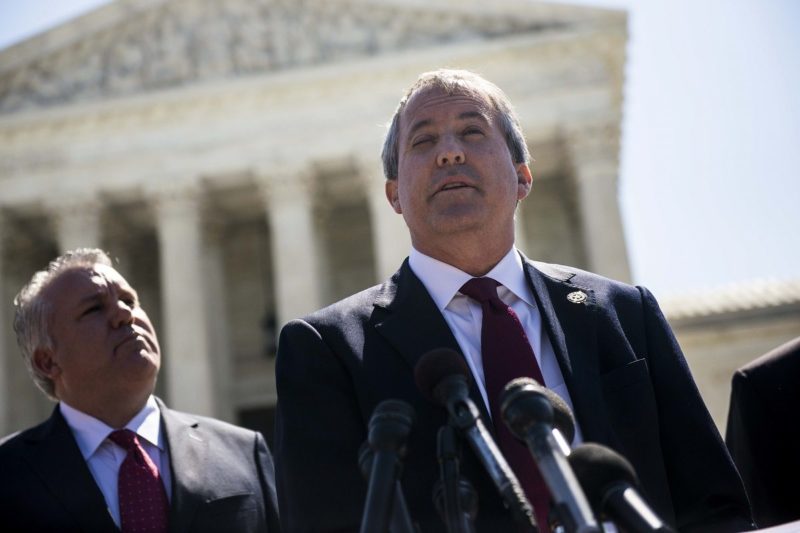Texas Asks Supreme Court to Reinstate Voter ID Law
Republican legislators in state legislatures that have passed rigid voter ID laws have claimed that such laws are necessary to prevent in-person voter fraud. GOP-led investigations have not turned up evidence of voter fraud.

Texas Attorney General Ken Paxton filed a petition with the U.S. Supreme Court on Friday seeking reinstatement of the state’s voter ID law.
The petition asks the court to reverse the Fifth Circuit Court of Appeals’ ruling in Veasey v. Abbott that Texas’ voter ID law, SB 14, disproportionately burdens Black and Latino voters and violates the Voting Rights Act (VRA) of 1965.
The petition asks the Court to resolve what Texas declares is an “exceptionally important circuit split,” and that is whether a claim for violation of Section 2 of the Voting Rights Act, which forbids voting procedures that discriminate on the basis of race, requires a plaintiff to demonstrate that the voting procedure being challenged had a negative impact on voting for people of color. (A circuit split occurs when the law in one group of states—called a circuit—differs from the law in another circuit. Because the Supreme Court likes to have laws that bind the entire country, it will intervene to resolve the circuit split so the law will be uniform across all states.)
The Fifth Circuit, like the Fourth Circuit, which struck down North Carolina’s voter ID law in League of Women Voters of North Carolina v. North Carolina, applied a legal standard that differed from that applied in recent voting rights cases out of the Sixth, Seventh, and Ninth Circuits, according to Paxton’s attorneys.
The petition argues that the Sixth, Seventh, and Ninth Circuit Courts of Appeal require that plaintiffs suing under Section 2 of the VRA show that a challenged voting prerequisite—like obtaining a government-issued photo ID—causes a negative affect on the turnout or registration of voters of color.
But in the Fourth and Fifth Circuits, according to petition, a voting prerequisite can violate VRA Section 2 even if there’s no evidence that the prerequisite disenfranchises voters of color or prevents a single person from voting. Unlike in the Sixth, Seventh, and Ninth Circuits, which require evidence of deleterious effect on voters, the Fourth and Fifth Circuits have used statistics regarding voter ID possession among Black and Latino voters to determine whether the laws disproportionately impact those voters.
Paxton’s attorneys argue that the Fourth and Fifth Circuit got it wrong. In Texas’ estimation, SB 14 does not violate Section 2 of the VRA because the plaintiffs in the case “presented no evidence that the law resulted in diminished minority political participation or prevented even a single person from voting.”
Texas wants the Supreme Court to force the Fifth Circuit to follow the example set by the Sixth, Seventh, and Ninth Circuits. Under applicable law in those circuits, the Veasey plaintiffs would have lost the case and the Republican-backed voter ID law would still be in effect.
Several critics have questioned Paxton’s decision to seek relief at the Supreme Court.
“[T]he real question is why Attorney General Paxton would waste upwards of $3.5 million taxpayer dollars (and counting) defending a law that disenfranchises more than 600,000 eligible voters. Instead of suppressing the vote, we ought to do everything in our power to ensure that every qualified voter participates,” Rebecca L. Robertson, legal and policy director of the American Civil Liberties Union of Texas, said in a statement.
“Ken Paxton and Greg Abbott threw another bale of taxpayer money in the dumpster and set it on fire,” Matt Angle, the director of the Lone Star Project, said said in a statement.
Paxton’s petition seeking review will have no effect on November’s election. Voters who do not have the type of photo ID required by Texas’ voter ID law will still be able to vote using other forms of identification.
U.S. District Court Judge Nelva Gonzales Ramos approved a plan that would allow voters without the requisite photo identification to vote in Texas in the November election in response to the Fifth Circuit’s ruling in July.
Under Ramos’ order, people can vote if they sign a declaration of citizenship and present proof of residence in Texas, such as a paycheck stub, bank statement, or utility bill, according to the Texas Tribune.
Paxton raised the specter of voter fraud yet again in a written statement about his decision to go forward with the Supreme Court appeal.
Republican legislators in state legislatures that have passed rigid voter ID laws have claimed that such laws are necessary to prevent in-person voter fraud. GOP-led investigations have not turned up evidence of voter fraud. A study conducted by Loyola Law School professor Justin Levitt found a mere 31 credible incidents of voter impersonation out of more than 1 billion votes that were cast nationwide from 2000 through 2014.
